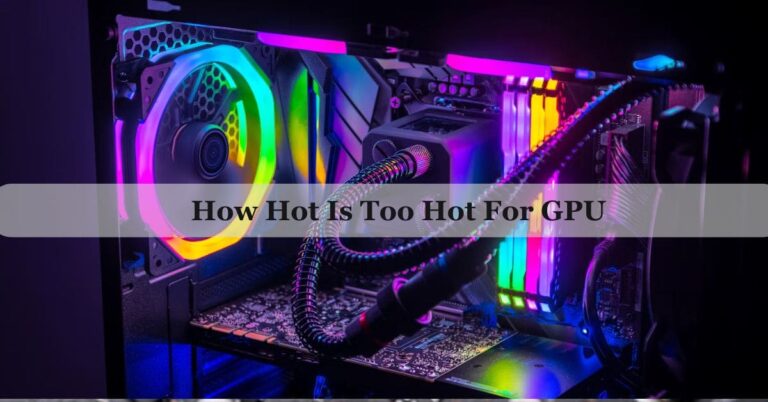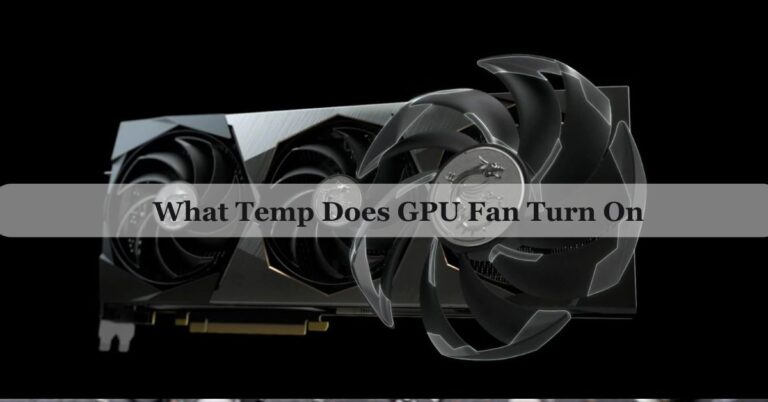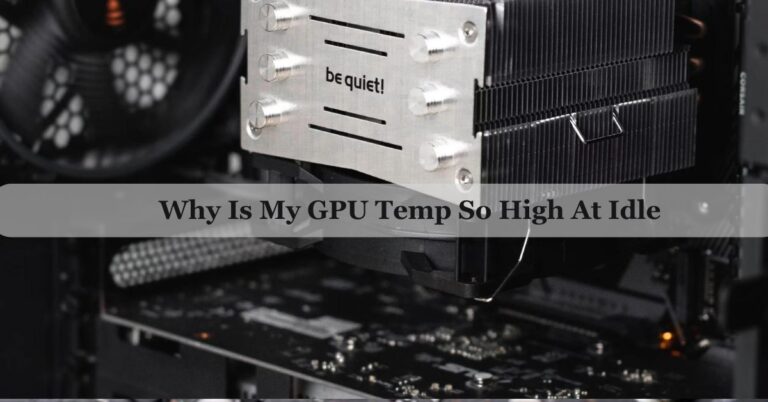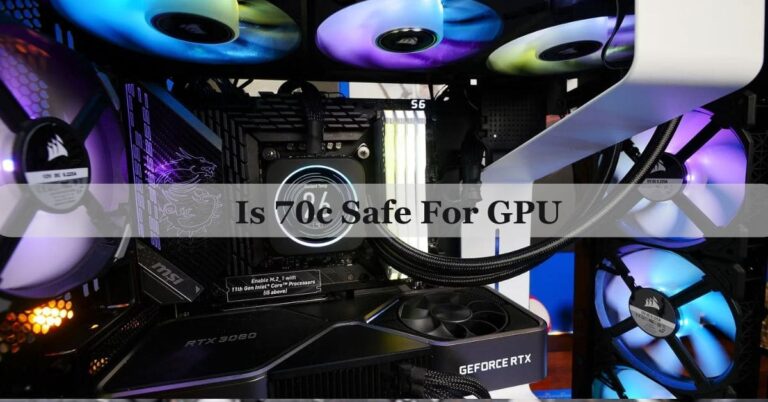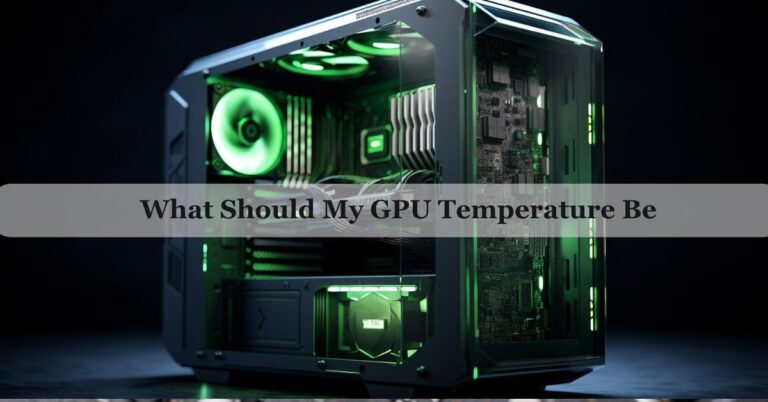Is 85 C Hot For GPU – Complete Guide Of 2024!
To keep your computer working well, it’s important to know about GPU temperatures. The GPU (Graphics Processing Unit), is a key part for gaming and powerful tasks. Keeping it cool helps it work better and last longer.
85°C is a high temperature for a GPU but usually safe. If the GPU stays this hot for too long, it could shorten its life. It’s best to keep the GPU cooler to help it run better and last longer.
In this article, we will discuss GPU’s ideal Temperature and also “Is 85 C Hot For GPU”.
Understanding GPU Temperatures:
1. What Is GPU Temperature?
GPU temperature is how warm your graphics card gets while it’s running. It measures the heat produced by the GPU when it’s working on tasks like gaming or video processing. Keeping track of this temperature helps ensure your GPU stays within a safe range.
2. How GPU Temperature Affects Performance?
When the GPU temperature gets too high, it can slow down your computer to avoid overheating. This means you might notice lower performance, like slower graphics or game lag. Keeping the GPU cool helps maintain good performance and prevent these issues.
Why Does GPU Temperature Matters?
GPU temperature matters because if your graphics card gets too hot, it can cause problems. High temperatures can slow down your computer, make it crash, or even damage the GPU over time. Keeping your GPU cool helps it work better and last longer, so it’s important to monitor and manage its temperature.
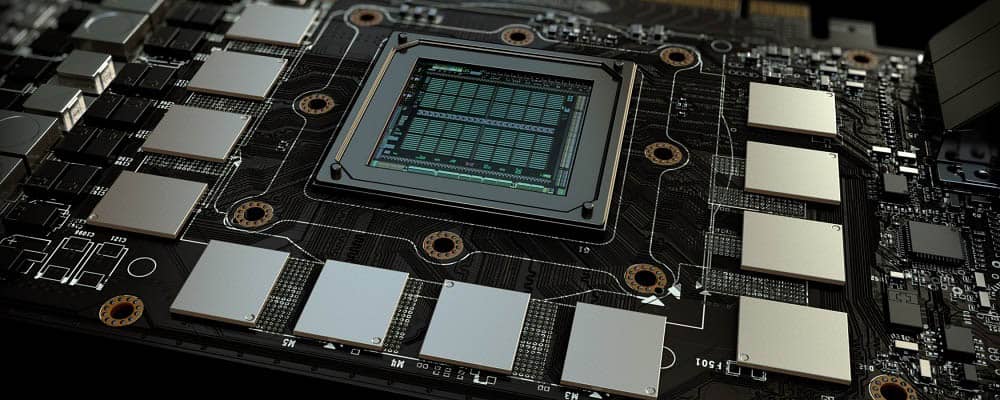
Optimal GPU Temperature Range:
Recommended Temperature Range For GPUs:
For most GPUs, the best temperature range is between 70°C and 80°C. Within this range, the GPU performs well and stays safe. Temperatures above 80°C can lead to slower performance and potential damage, so it’s good to keep your GPU cooler if possible.
Factors Influencing Optimal Temperature:
The ideal temperature for your GPU depends on how well your cooling system works, the airflow in your computer case, and the room temperature. Heavy tasks and poor airflow can make the GPU run hotter. Keeping these factors in check helps manage the GPU temperature better.
Is 85 C Hot For GPU?
What Does 85°c Mean For Your GPU?
85°C is on the higher side for GPU temperatures. While many GPUs can handle this heat, it is not ideal for long-term use. Running at 85°C often can lead to reduced performance and may cause the GPU to wear out faster.
How To Manage High GPU Temperatures?
To manage a GPU temperature of 85°C, try improving cooling in your computer case. Ensure your fans are working properly, clean any dust, and consider using better cooling solutions. Keeping the GPU cooler helps it perform better and last longer.
Factors Affecting GPU Temperature:
Cooling System Efficiency:
The cooling system, including fans and heatsinks, is crucial for keeping your GPU cool. If the cooling system is not working well or is clogged with dust, the GPU can get too hot. A well-maintained and effective cooling system helps keep the GPU at a safe temperature.
Airflow In Your Computer Case:
Good airflow inside your computer case helps remove heat from the GPU. If your case has poor airflow due to dust buildup or obstructed vents, the GPU temperature can rise. Adding or adjusting case fans and keeping the interior clean can improve airflow and lower temperatures.
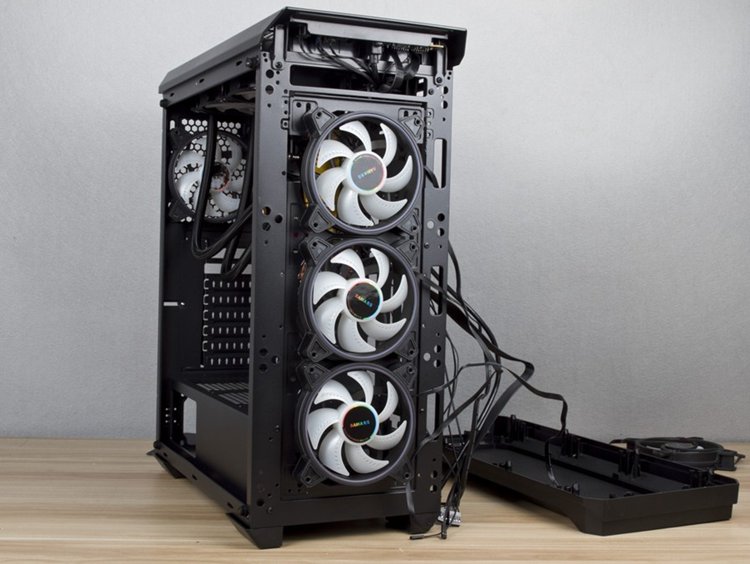
Room Temperature:
The temperature of the room where your computer is used affects the GPU temperature. A hotter room can make the GPU run warmer. Keeping the room cool or using air conditioning can help maintain lower GPU temperatures.
Workload And Usage:
The tasks your GPU is performing also impact its temperature. Heavy tasks like gaming or video editing make the GPU work harder, generating more heat. Reducing the workload or adjusting settings can help manage the GPU temperature better.
Effects Of High GPU Temperatures:
1. Short-term Effects On Performance:
When your GPU gets too hot, it can slow down to prevent damage, leading to lower performance and lag. This means games or applications might run less smoothly until the temperature goes down.
2. Long-term Effects On Hardware:
Consistently high GPU temperatures can damage the hardware over time, leading to reduced lifespan and potential failures. This can result in permanent performance issues and the need for expensive repairs or replacements.
Monitoring GPU Temperature:
- Use Software Tools: Install programs like MSI Afterburner or GPU-Z to check your GPU temperature in real-time.
- Check Temperature Regularly: Keep an eye on temperatures during heavy use to ensure they stay within a safe range.
- Set Up Alerts: Some monitoring tools let you set temperature alerts to warn you if the GPU gets too hot.
- Review Performance Logs: Look at logs from monitoring tools to track temperature changes and identify patterns.
- Update Drivers: Make sure your GPU drivers are up to date, as updates can help improve performance and temperature management.
Cooling Solutions For GPUs:
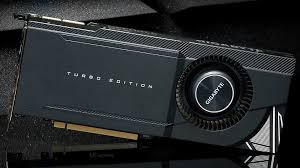
Air Cooling:
Air cooling uses fans and heatsinks to cool your GPU. Fans blow air over a heatsink attached to the GPU, helping to remove heat. It’s a common and affordable solution but can be less effective in very hot environments or with heavy GPU use.
Liquid Cooling:
Liquid cooling uses a liquid coolant to absorb heat from the GPU. The coolant flows through tubes and a radiator, where it’s cooled by fans. This method is more efficient than air cooling and can handle higher temperatures, but it’s more complex and expensive.
Hybrid Cooling:
Hybrid cooling combines air and liquid cooling. It uses liquid cooling for the main part of the GPU and air cooling for additional support. This setup aims to offer the benefits of both methods, providing effective cooling with less noise and better temperature control.
Tips To Maintain Optimal GPU Temperature:
1. Keep Your PC Clean:
Regularly clean your computer to remove dust from fans and vents. Dust can block airflow and increase temperatures.
2. Improve Case Airflow:
Ensure your PC case has good airflow. Arrange cables neatly and consider adding more fans to help with ventilation.
3. Check and Update Cooling Systems:
Make sure your GPU’s cooling system, including fans and heatsinks, is working properly. Upgrade to better cooling solutions if needed.
4. Monitor GPU Temperature:
Use software tools to keep track of your GPU temperature. Set up alerts to notify you if temperatures get too high.
5. Apply Fresh Thermal Paste:
Reapply thermal paste between the GPU and its heatsink if it becomes old or dry. This helps improve heat transfer and cooling efficiency.
6. Avoid Overclocking:
Overclocking increases the heat your GPU generates. Stick to the GPU’s standard settings for safer temperature levels.
7. Keep the Room Cool:
Use air conditioning or fans to lower the room temperature. A cooler room helps keep the GPU temperature down.
8. Maintain Proper Ventilation:
Ensure there’s enough space around your computer for air to flow freely. Avoid placing it in enclosed or tight spaces.
9. Regularly Check Fan Speeds:
Make sure the fans in your PC and on your GPU are spinning correctly. Replace any faulty fans to maintain good cooling performance.
Is 84°c Too Hot For A GPU?
Yes, 84°C is quite hot for a GPU. Most GPUs work best below 80°C. Occasionally reaching 84°C is okay, but staying at high temperatures can shorten the GPU’s life and cause performance issues.
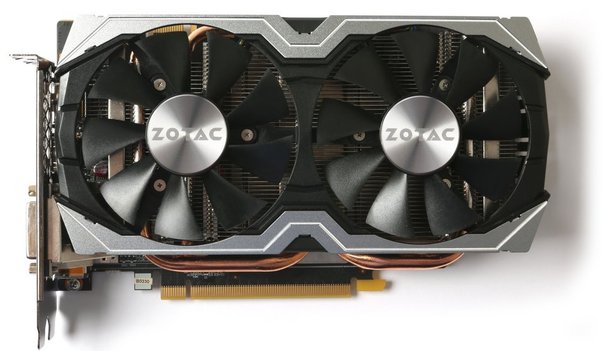
Is 85°c Safe For A 3070?
85°C is a bit high but still safe for an RTX 3070. It’s better to keep it under 80°C for better performance and longer life. Regularly hitting 85°C can reduce the GPU’s lifespan and efficiency.
Is 85°c Too High For A CPU?
Yes, 85°C is high for a CPU. It can handle it for a short time, but it’s best to keep it under 80°C to avoid performance problems and extend the CPU’s life.
How To Monitor An Nvidia GPU’s Temperature?
To check an Nvidia GPU’s temperature, use tools like MSI Afterburner, GPU-Z, or HWMonitor. Open the software to see the current temperature and other details about your GPU.
The Ideal GPU Temperature Range For Gaming?
The best temperature range for a GPU while gaming is between 65°C and 85°C. Staying in this range helps with good performance and long life. Temperatures consistently higher than this can reduce performance and shorten the GPU’s life.
Is 86°c Too Hot For A GPU?
Yes, 86°C is very hot for a GPU. It can manage this temperature briefly, but keeping it below 80°C is better to avoid performance issues and help the GPU last longer.
Is 85°c Hot For A Laptop GPU?
Yes, 85°C is hot for a laptop GPU. It can handle this temperature for a short time, but it’s better to keep it below 80°C to avoid problems and extend the GPU’s life.
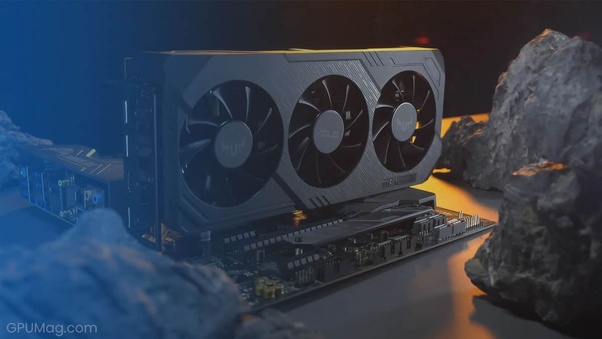
Is 85°c Hot For A GPU While Gaming?
Yes, 85°C is hot for a GPU during gaming. It can manage this temperature for a short time, but keeping it under 80°C helps avoid performance issues and lengthens the GPU’s life.
Is 85°c Hot For A 3060?
Yes, 85°C is hot for an RTX 3060. It can handle this temperature briefly, but keeping it below 80°C is better for performance and to extend the GPU’s lifespan.
Is 86°c Hot For A Laptop GPU?
Yes, 86°C is hot for a laptop GPU. It can handle this temperature for a short time, but keeping it under 80°C is better for performance and to help the GPU last longer.
GPU At 86°c While Gaming:
86°C is hot for a GPU during gaming. Although it can manage this temperature for a while, keeping it below 80°C helps avoid performance issues and extends the GPU’s life.
Is 90 Degrees Hot For GPU?
Yes, 90°C is quite hot for a GPU. While many GPUs can handle this temperature for short periods, it’s better to keep it lower. Regularly reaching 90°C can lead to performance problems and shorten the GPU’s lifespan.
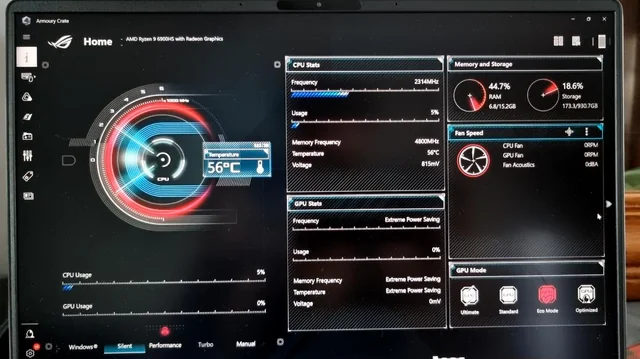
Is 85°c Hot For A CPU?
Yes, 85°C is high for a CPU. It’s better to keep it below 80°C to prevent overheating, which can cause performance issues and shorten the CPU’s life.
FAQs:
1. How Often Should I Clean My GPU To Prevent Overheating?
Cleaning your GPU and PC every few months helps prevent dust build up and keeps temperatures down.
2. Does Adding More Fans Help With GPU Cooling?
Yes, adding more case fans can improve airflow and help lower GPU temperatures.
3. Can Overclocking Cause My GPU To Reach 85°c?
Yes, overclocking increases the heat your GPU generates, which can lead to higher temperatures.
4. Should I Use Aftermarket Cooling Solutions For My GPU?
If your GPU frequently reaches high temperatures, an aftermarket cooling solution might be a good idea.
5. How Do I Apply Thermal Paste To Lower GPU Temperatures?
Reapply thermal paste between the GPU and its heatsink to improve heat transfer and help lower temperatures.
6. Can A Dusty Pc Case Cause High GPU Temperatures?
Yes, dust can block airflow and reduce cooling efficiency, leading to higher GPU temperatures.
7. What Are The Signs Of GPU Overheating?
Signs include reduced performance, system crashes, or unusual fan noise.
8. Is It Safe To Use My GPU At 85°c?
While many GPUs can handle 85°C, it’s better to keep temperatures lower to avoid potential issues and extend the GPU’s life.
Conclusion:
In conclusion, 85°C is quite hot for a GPU, though many can handle this temperature briefly. For better performance and longer life, aim to keep the GPU cooler, ideally below 80°C. Regular monitoring, proper cooling, and maintaining your PC can help manage temperatures and ensure your GPU runs efficiently.


